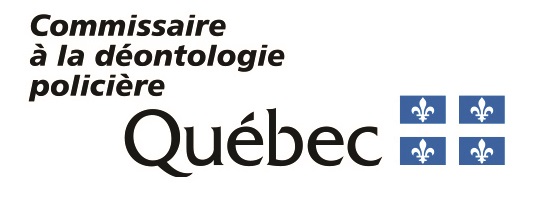About us
Service Statement
Service Statement
The commitments made in this declaration determine the level and quality of services that a citizen can expect when contacting the Commissaire à la déontologie policière. These are shared by all its staff and we intend to do everything possible to ensure that they are respected.
In this Service Statement
Our Mission
The Values that Support our Mission
Our Services
Quality of our Services
Improvement of our Services
Review of our Statement
Our Mission
The Commissaire à la déontologie policière receives and examines complaints made against police officers, wildlife protection officers, special constables, highway controllers and UPAC investigators who allegedly violated the Code of Ethics of Quebec Police Officers (CQLR, chapter P- 13.1, r.1). It provides independent, impartial and fair civilian oversight of their conduct.
The Values that Support our Mission
- Protection of rights and freedoms
- Independence
- Impartiality
- Transparency
- Rigor
The Commissaire à la déontologie policière and all of its staff is concerned, above all, with the protection of the rights of citizens and the observance of high standards of service and professional conscience by the police officers, special constables, highway controllers, wildlife protection, UPAC investigators and BEI investigators.
Our Services
In accordance with the Police Act (CQLR, chapter P-13.1), the main services provided by the Commissaire à la déontologie policière are the following:
- help citizens formulate their complaints;
- determine, after initial review, the appropriate mode of handling complaints;
- hold conciliation sessions;
- carry out ethics investigations;
- issue written and reasoned decisions when there is reason to close a file;
- review, at the request of complainants, decisions to close a file before an ethics investigation is completed;
- summon the police officers before the Comité de déontologie policière (ethics tribunal) when there is sufficient proof of a derogatory act;
- make appropriate representations before the ethics tribunal and common law courts;
- communicate to the ethics tribunal the information and observations necessary for the examination of the requests for apology submitted to it.
Quality of our Services
Accessibility
You can communicate with us online at any time from our website;
You can contact us by phone during our business hours. Our offices are open Monday to Friday from 8:30 a.m. to 12 p.m. and from 1 p.m. to 4:30 p.m.;
*NOTE: Please note that our offices are currently closed to the public due to COVID-19.
You can reach us from anywhere in Quebec using a toll-free line;
You can leave us a message at any time on our voicemail;
Conciliations and investigations are held in all regions of Quebec;
The Commissaire à la déontologie policière offices and our services are adapted to the needs of people with disabilities. We try, as much as possible, to respect the preferences on the choice of a solution appropriate to your handicap.
Reception, Assistance and Behavior
You are treated with courtesy and respect in all your communications with the Commissaire à la déontologie policière or its staff.
We respond as quickly as possible when you use our services, so we try to:
- call you back within a maximum of 1 working day;
- respond to your request for information or assistance received by mail, fax or e-mail within a maximum of 3 working days.
When you come to our offices, we provide you with all the necessary assistance.
If your request does not fall within our mandate, we will direct you to the service that will be best able to meet your needs.
The information that will be communicated to you verbally or in writing will be clear, precise and reliable.
Processing of Police Ethics Complaints
Complaints are handled diligently, impartially and fairly, taking into account the rules established by law and case law.
The deadlines set at each stage of the police ethics process are respected or extended under the powers conferred by law or according to our operational policies to:
- Inform, after initial examination, of the orientation given to the handling of a complaint : 40 days;
- Hold a conciliation session : 45 days;
- Investigate : 6 months;
- Dispose of a request for review of the decision to close a file : 10 days.
You are informed in accordance with the law of any significant development concerning you.
The Commissioner's decisions to close a file are written and reasoned in accessible language.
You are informed of your rights and the procedures for exercising them if you are dissatisfied with a decision by the Commissioner.
Online and paper forms are available to facilitate the exercise of your rights. A request for review form is sent to the complainant with the Commissioner's decision to close a file. Online forms can be completed on our website.
Protection of Information
The Commissaire à la déontologie policière ensures the confidentiality of the information entrusted to it and which is protected by law, in particular, that having an impact on the administration of justice and public safety.
Improvement of our Services
The Commissaire à la déontologie policière and its staff listen to citizens at each stage of the ethics process. Wherever possible, we aim to improve the access, quality, effectiveness and efficiency of our services.
Within our organisation, the person responsible for coordinating the service improvement policy and reporting to the Commissioner is the Secretary General. Do not hesitate to communicate with her.
You can also contact the Protecteur du citoyen.
About us
Need help?
If you want more information or if you need help drafting your complaint, you can contact us.
deontologie-policiere.quebec@msp.gouv.qc.ca
